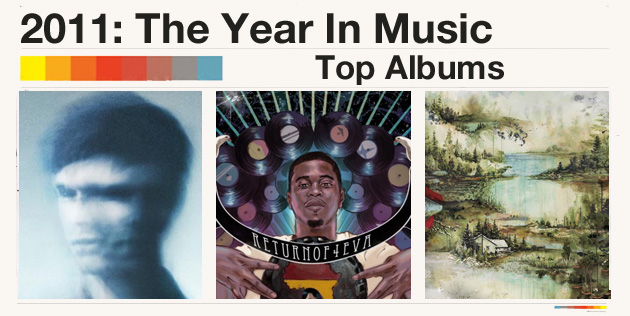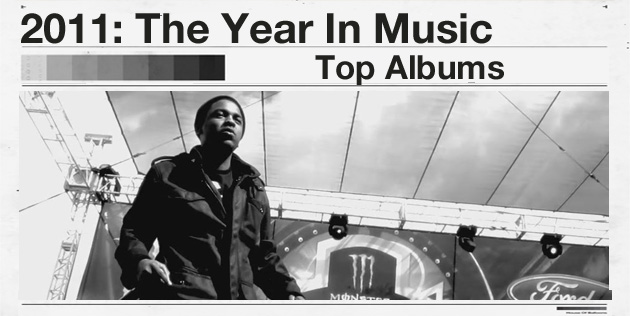Listen to One Thirty BPM’s top albums of 2011 in this Spotify playlist.

20.
Bon Iver
Bon Iver, Bon Iver
[Jagjaguwar / 4AD]
We all have different criteria for compiling our personal year-end lists. Most of the bullet points are obvious, but one that I always emphasize is how unique a record feels compared to its peer group; this is similar to baseball writers grading today’s hall of fame nominees against the players of their own era, rather than those who played in the 1890s. Bon Iver, Bon Iver is, to me at least, one of the most instantly recognizable records of the year. Sure, many of the sounds — especially those triumphantly ironic horns on “Beth/Rest” — are derivative of past decades, but so what? At a time when trumped up genres like chillwave and definitions such as lo-fi leave so many bands strapped for identity, Justin Vernon’s cabin-turned-coliseum art project radiates with personality. Never mind the hype, the expectations, or the daunting, pass-the-decoder lyricism; Bon Iver, Bon Iver is simply one of the year’s most breathtaking releases.
– Andrew Bailey
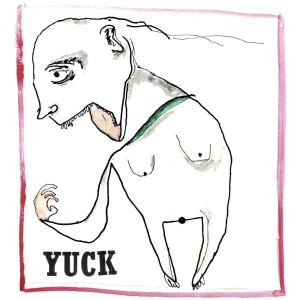
19.
Yuck
Yuck
[Fat Possum / Mercury Records]
There are albums that so perfectly evoke the essence of a certain musical era that it seems a shame they aren’t actually from it. Yuck is one of them. From that wobbly opening riff straight through to the final fadeout, the fingerprints of Dinosaur Jr., Guided by Voices, Pixies and about a dozen others are smudged all over the Londoners’ debut. It would be easy to rip the sounds and styles of these bands and leave it at that, but Max Bloom and Daniel Blumberg let their songs speak for themselves as they keep Yuck afloat amidst all of the tasteful mimicry. On tracks like “Suicide Policeman” and “Sunday,” the melodies unravel in a way that’s keenly intuitive, and the bursting guitar shapes on “Operation” makes for one of the catchier tunes of the year. By touching all of these feel-good sweet spots and tipping its cap to history’s musical victors, Yuck plants its feet on an interesting middle ground: nostalgia for those who are too young to get nostalgic. And for those who are, it’s a gentle tap on the shoulder reminding you why Yuck’s heroes are your heroes too.
– Brendan Frank
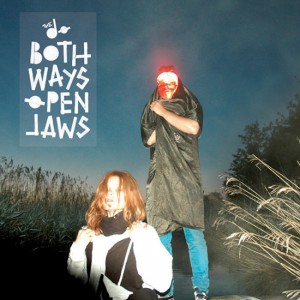
18.
The Do
Both Ways Open Jaws
[Get Down]
You can’t easily pin down just what it is, precisely, that The Dø are doing: Both Ways Open Jaws joins a slew of recent indie explorations that defy simple quantification, despite knee jerk comparisons to Animal Collective and Joanna Newsom. The record flirts with freak pop and the sort of musical meandering that would make David Tibet proud. In fact, Thunder Perfect Mind isn’t too far from memory when this one plays. That’s far from calling it derivative, to the contrary, a pop adventure such as this is in fine, and rare, company. The album pulls off both its quiet moments, superb, immediate catchiness with “Too Insistent” and “Bohemian Dances,” and grand theatrics, such as on “Wicked & the Blind.” Jaws isn’t quite a perfect record, and hence seemed to drift largely under the radar this year. With the infectious progress displayed here, on their sophomore effort, expect to see The Dø on more lists come LP #3. They’re on the brink.
– Chase McMullen
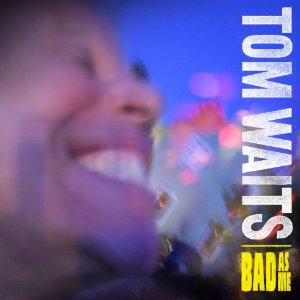
17.
Tom Waits
Bad As Me
[ANTI-]
Tom Waits is a masterful conductor always on the right track. This is evident from the onset of “Chicago”; from there, Bad as Me churns forward with a wider scope than we might have expected. In his interview with Pitchfork, Waits commented on how his wife Kathleen Brennan “wanted to do 12 three-minute songs,” adding that he has becoming more “economical” in his songwriting process. Market the album as you wish, but Bad as Me doesn’t stand as Tom Waits’ first attempt at compartmentalization; Swordfishtrombones (1983), the first album informed by Kathleen Brennan, was marginally leaner by comparison. If anything, the tightened focus on shorter songs is likely a result of the exhaustion after compiling 56 songs – 30 of which were new – for the stellar three-disc Orphans collection (truly the perfect distillation of what makes Tom Waits the best musician still living).
Even Bad as Me‘s closing song, “New Year’s Eve,” was cut down from what we presume could have been a “Sins of My Father”-sized track; the end result hints at this potential to reach out exponentially, and really it’s the only track to suggest a larger presence. Ultimately, Waits caved to his impulses, also releasing a deluxe CD-version of the album, which adds three bonus tracks. These extra tracks are largely superfluous, yet critical for the Waits completist.
Admittedly, this has been a lot of talk about his back-catalog, but Bad as Me rarely sees Waits branching out beyond what we’ve come to expect from him. This is simultaneously a terrific revelation because his albums have been uniformly great for most of his career, but also disconcerting, knowing there are few dark alleys he hasn’t traversed. The clamoring military-style verses and blue-collar lyrics of “Hell Broke Luce” are a welcome detour, and if we are to resort to Orphans-style categorizations, it appears to be the lone bastard. Elsewhere, I count seven potential bawlers out of thirteen total tracks: “Talking at the Same Time”; “Face to the Highway”; “Pay Me”; “Back in the Crowd”; “Kiss Me”; “Last Leaf”; “New Year’s Eve.” That means bawlers consume 25 out of a possible 44.5 minutes, which equates to 56% of the album. Therefore, Bad as Me is a bawler-based album with a brawler for a title track. But the true bright spot will always be the bastard in his heart.
– Michael Tkach

16.
Fucked Up
David Comes To Life
[Matador]
Look, I could throw out a whole bunch of adjectives to describe Fucked Up’s David Comes To Life, but you’ve already heard them. I could talk about how everything the band has been doing has been leading to this moment, to this 78-minute rock opera (of all things), and not only did they live up to their own, and our, expectations, but they set the bar higher than anyone could’ve imagined for the next batch of punk rock bands. I could go off about how Fucked Up remind you that punk — the stodgiest of genres — is a world forever rife with possibilities. Throw in some stuff about how David Comes To Life is a guitar-lover’s dream and that the band’s rhythm section has never sounded tighter and that Pink Eyes is both the most loveable and bad ass frontman you will ever hear. Or you could just listen to the way that intro fades out and after just a moment the monster riff that opens “Queen of Hearts” roars in and just shreds you to pieces.
– Jon Blistein
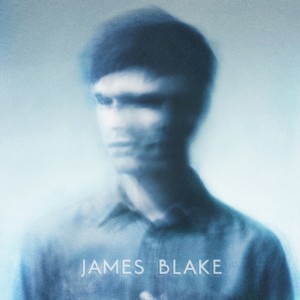
15.
James Blake
James Blake
[Atlas / A&M]
If there’s anything to learn about James Blake’s post-dubstep production, it’s its keen awareness for space and restraint. Though his self-titled debut consists of the kind of delicately produced beats that audiophiles only get to experience every-so-often, it ultimately revolves around subdued motifs (sparse instrumentation, measures of rest, vocal manipulation, etc). All of these elements are so fragile and so delicate to the production as a whole, that it often feels like the music is on the brink of collapse. This is all the more impressive considering that Blake is such a technically gifted beatmaker (as evident on his previous releases, CMYK and Klavierwerke).
But let’s forget about the most important element: James Blake’s debut LP introduces him as a singer-songwriter. And what an interesting songwriter he makes — crossing the boundaries of conventional songwriting by utilizing repetition and space as structural extensions. Songs like “Lindesfarne II” and “The Wilhem Scream,” for instance, demonstrate Blake’s uncanny ability of reiterating vocal melodies with subtley changing backgrounds (ex: the crescendoing synths on “The Wilhelm Scream”). Not since Burial has a London-based producer accomplished such similar feats.
– Ryan Studer

14.
Gang Gang Dance
Eye Contact
[4AD]
I like to think there’s a parallel universe where Gang Gang Dance’s brand of alien pop is topping the charts. It’s all here: major-key immediacy, melodic escapism, a charismatic frontwoman, danceability – so what if Eye Contact‘s lead-single was almost twelve minutes long? That’s three radio-ready songs for the price of one! Alas…
The group named this, their fifth album, Eye Contact to differentiate their mode of delivery from previous outings. Not that the music here isn’t improvised and long-form. “Glass Jar” spends the majority of its eleven and half minutes building layers of tropical, cosmic synths toward its motorik descent. And there’s no doubt Gang Gang Dance is still heavily indebted to pop music from abroad. But the sound on Eye Contact is without psychedelic ambiguity while still managing vivid technicolor imagination. The richly melodic, and surprisingly complex, arrangements led by Lizzi Bougatsos’ angelic vocal energy give rise to an aggressively creative and joyfully unpredictable forty-eight minutes. Its urgent hook-after-hook sense of immediacy on songs like “Chinese High” and “MindKilla” would be goddamn overbearing if not for the tonal diversity on display with tracks like the foreboding “Adult Goth” or psych funk slow jam, “Romance Layers.”
– Will Ryan
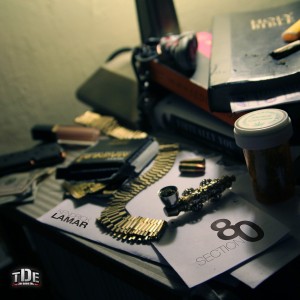
13.
Kendrick Lamar
Section.80
[Top Dawg Ent.]
Dre is never going to put out Detox, Snoop is too old, and Game has been dipping in quality with every subsequent release. What happened to west coast hip-hop?
Luckily Compton’s Kendrick Lamar seems to have given it a much needed kickstart with his first full-length Section.80. The iTunes exclusive isn’t your typical west coast album though. Violence and drug use isn’t romanticized, but rather displayed as issues that youths struggle with. It’s politically charged, deeply personal, and a refreshing listen for all of those tired of west coasts artists churning out the same sound year after year.
Kendrick Lamar is part of a new breed of hip hop artists striving to change the status quo ridden with poor quality standards, little creativity, and materialism. Take these values and message and add them with his incredible flow and rhyming and you’d got the best traditional rap album of the year. Watch the throne, the new west coast king is here.
– Evan Kaloudis
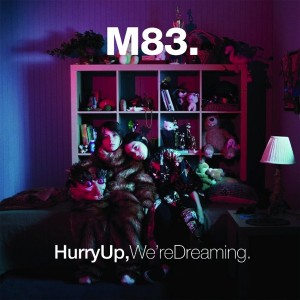
12.
M83
Hurry Up, We’re Dreaming
[Mute]
It certainly took him long enough, but with Hurry Up, We’re Dreaming, M83 finally got it right. Just what did he get right? Well… everything he had attempted up to this point. This expansive album, which Anthony Gonzalez first described appropriately as “very, very, very epic,” plays like a best-of collection, touching on every genre and idea that he had toyed with in his career up to this point. The shoegaze wash of Dead Cities, Red Seas and Lost Ghosts, the ambient textures and pummeling choruses of Before the Dawn Heals Us, and the pop sensibilities of Saturdays = Youth are all present here, forming an album that should appeal to whatever parts of M83’s music one might like best. This would make for a great album on its own, but the truest strength of Hurry Up, We’re Dreaming is its ability to work as a complete statement, much in the same way that Joanna Newsom’s similarly massive, (though completely different), Have One On Me did last year. From beginning to end, Hurry Up, We’re Dreaming is a fascinating listen that moves effortlessly from the likes of gorgeous, heart-stopping ballads, (“Wait”), to kitschy and intentionally precious sample based grandeur, (“Raconte-Moi Une Histoire”). There are at least six songs on this album that could succeed as stand-alone singles and equally as many ambient pieces that tie them all together, yet no song could have been removed without it being to the detriment of the album proper. Hurry Up, We’re Dreaming might be difficult for some to take in or accept because it is simply so massive an undertaking and so dense in its textures, but given the opportunity, it will capture your imagination and astound you at every turn.
– Ricky Schweitzer

11.
PJ Harvey
Let England Shake
[Vagrant Records]
Polly Jean Harvey, at this point, is finer than she’s ever been. She’s over her riot grrl days of the 90s, transitioning from the raw, disturbingly awesome music of her early career into a matured sound on Let England Shake that’s even stronger than 2007’s piano-driven balladry of White Chalk. On England, Harvey moves into a wide range of political and social commentary, which, while this decade has had plenty of, Harvey makes it her own and delivers with an enormous amount of intensity and clarity. The heavy use of piano on White Chalk leads to a more mixed sound on England, as guitar, brass, and even autoharp feature heavily. The songwriting is as catchy as ever, as Harvey’s higher register of vocals (a staple on White Chalk) return even stronger here. The melodies are among the strongest she’s written in her career, as are the songs. There’s plenty of singles here, in the bouncy title track, the vicious “Words That Maketh Murder” and the Sufjan-ish “Written on the Forehead” all ranking among her catchiest songs. It’s not uncommon for esteemed songwriters (such as her peers Björk and Kate Bush) to deliver fantastic albums late in their career, but it is rare for them to release their best work. Leave it to PJ to do so.
– Ryan Nichols

